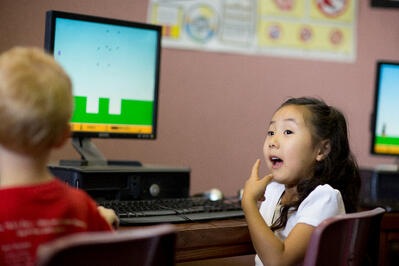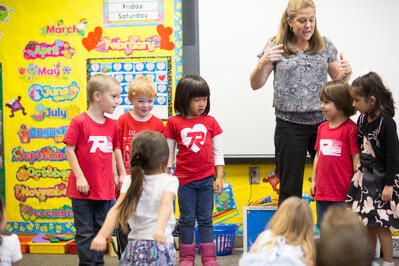
By: Cynthia Olivas, Ed.D
Transitional Kindergarten (TK) has the potential to “even the playing field” for children who have unequal access to experiences that assist in developing foundational skills needed for meaningful learning. Meaningful learning is evident in quality curriculum. Children who are able to demonstrate their understanding of concepts by communicating, representing, problem solving, and applying concepts in their daily lives have the capacity to meet educational goals at every grade level. To access and develop these skills, children must have early learning opportunities which foster growth in these areas prior to entering kindergarten.
Foundational Skills Needed for Meaningful Learning:
 Communicating – How do children verbalize what they know, want, and understand? How do they let parents, teachers, and peers know what they know, want, and understand? Are they able to listen to, and understand others? Are they able to follow directions and communicate a sequence of events?
Communicating – How do children verbalize what they know, want, and understand? How do they let parents, teachers, and peers know what they know, want, and understand? Are they able to listen to, and understand others? Are they able to follow directions and communicate a sequence of events?
Build a foundation for communication skills by encouraging children to:
Representing – How do children demonstrate to parents, teachers, and peers what they know? What strategies do they choose to represent their understanding? Do they draw pictures, build models, use body movements and gestures, or represent understanding in numbers or words?
Build a foundation for representation by encouraging children to:
Problem Solving – How do children recognize when a problem exists? How do they react in situations that require intentional thought? What strategies do they use to approach problems? How do children use what they know to solve problems? Do they seek out information through books, technology, and other learning tools?
Build a foundation for problem-solving skills by encouraging children to:
 Applying Concepts – How do children use what they know in their everyday lives? How do they make connections between concepts learned at school and skills needed for success in everyday life? How do they build on what they know through problem solving and reasoning?
Applying Concepts – How do children use what they know in their everyday lives? How do they make connections between concepts learned at school and skills needed for success in everyday life? How do they build on what they know through problem solving and reasoning?
Build a foundation for concept application by encouraging children to:
Quality is Key in Transitional Kindergarten Curriculum
When teachers intentionally expose TK children to learning opportunities that promote the development of these skills, children are equipped for future educational success. Providing young children with an additional transitional year to acquire foundational skills through a quality TK curriculum gives them an opportunity to be as successful as their older peers. Additionally, for parents who lack time, resources, knowledge, or skills to provide engaging home experiences for children, a year of quality TK may provide experiences that may otherwise be delayed until entry to the formal kindergarten year.
Yes, a transitional year of kindergarten can be a driving force in the quest for early educational successes for children; however, quality is the key. If young children do not have access to TK programs of high quality, this extra year will only reinforce the educational gap so often associated with young and disadvantaged children.
Cindy Olivas, Ed.D., is an Associate Professor of Education and Interim Program Chair of the Undergraduate Child Development Program at University of La Verne. Her research interests include parents’ self-efficacy perceptions toward children’s homework tasks. She can be contacted at colivas@laverne.edu.
MIND Research Institute has worked with early childhood education professionals, brain researchers and mathematicians to develop ST Math: Transitional Kindergarten, a comprehensive math curriculum that meets the developmental and learning needs of the youngest students.

MIND Research Institute welcomes guest blogs that highlight best practices in math education, blended learning and innovative learning strategies that inspire students at all ages.
Comment